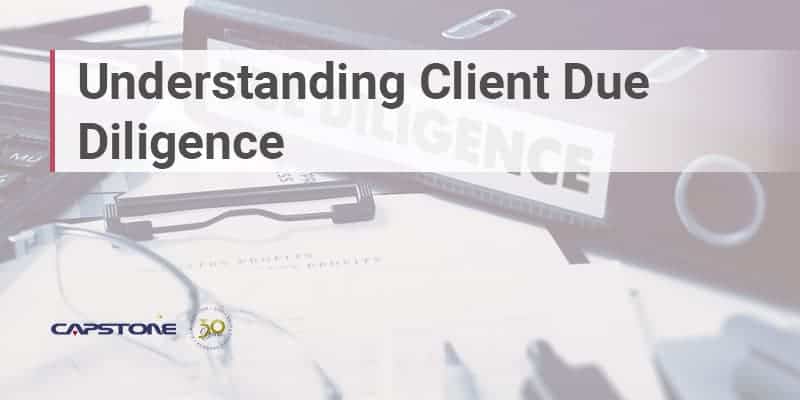A key component of being a successful financial broker or independent sales office (“ISO”) is understanding the process that prospective clients go through once you identify and refer a client to a factoring company.
The process, known as due diligence, is key in qualifying a client for an invoice factoring program and continuing to fund a client’s working capital needs on an ongoing basis. Understanding this process will ensure due diligence requests are handled smoothly, thereby increasing the likelihood of the client being approved and also saving you time, and helping you close more transactions.
In this article, we’ll review what due diligence is, what it entails, and why it is important to brokers for new and existing client relationships.
What Is Due Diligence?
Due diligence is the term given to an investigation that provides reassurance that a financial transaction is fair and true before completion. Due diligence in invoice factoring involves the review of prospective clients’ financial, legal and other relevant business information to determine if they meet the factoring company’s criteria for funding their working capital needs.
Due diligence can differ depending on the type of business funding required. Clients may have gone through other due diligence processes for business loans, real estate mortgages, or other types of financing. The due diligence process for invoice factoring is less complicated and time-consuming than the process for other forms of funding. Prospective clients should understand this difference. It will help them overcome concerns they may have and make the process easier for everyone concerned.
What Does Due Diligence for Invoice Factoring Entail?
With invoice factoring, due diligence represents one of the most important preliminary steps before proceeding with a transaction. There is no one size fits all approach for client due diligence so certain aspects of the process may vary depending on the amount of funding required, the client’s industry, the complexity of the transaction, and other associated risks.
The process begins with a client submitting the documents requested by the factoring company, in this case, Capstone. The documents requested usually include the following:
- Factoring application – The application should be filled out as much as possible, without errors, and include any additional forms with all necessary supplemental documentation to avoid delays
- Legal documents – The documents should include business formation documents, information on incorporation, lawsuits the client is a party to, outstanding judgments, tax issues, and liens
- Business owners – Information on individuals that own the business/ are officers of the company, including copies of driver licenses or other personal identification.
- Business offices, warehouses, and manufacturing locations – Addresses, descriptions, and other relevant information
- Accounts receivable and accounts payable aging reports
- Customer list – Information on contacts, location, sales volume, and payment history. The credit history and background of customers are reviewed. Customer credit history and financial strength are key factors in determining whether a factoring program is approved
- Copies of invoices to be factored
- Copies of contracts or purchase orders to match the invoices – Including supporting backup, bonds, and shipping document samples
- Other information – Depending on the client’s industry and the complexity of the transaction, this may include a professional license, proof of insurance, etc.
Upon receipt of the application packet, due diligence material, and due diligence fee, Capstone will begin legal documentation due diligence, account underwriting, and file a UCC-1 lien on the business.
Company searches and background checks are done to look for issues that may be problematic and require additional steps to resolve. Accounts receivable liens, bankruptcy, tax issues, and legal problems are examples of items that may require further action to clear them so that a factoring program can move forward.
Capstone will review the nature of the client’s business and transactions along with the customers that are served. The client’s invoices must be for B2B transactions with creditworthy entities in order to be eligible for factoring. A verification step is also performed on the invoice to confirm the validity of the account receivable.
Certain types of transactions may also not be eligible for factoring, including sales that are contingent on the client’s customer reselling the merchandise or being paid for the product and guarantees to return unsold inventory. In these situations, agreements with customers will need to be revised for the invoices to be factored.
Due diligence can be completed in a few days or require a week or more. It all depends on the state of the client’s business is formed in, the complexity of the client’s business or industry, and how prompt the client is in providing complete information and responding to questions.
Importance of Due Diligence
Due diligence in invoice factoring is essential for several reasons. Determining upfront if a client is suitable for invoice factoring saves brokers/ISOs from wasting valuable time onboarding prospects that cannot be approved. It also reduces the likelihood that clients will have problems after approval, which may require additional attention beyond the normal demands of an invoice factoring relationship. Understanding what due diligence entails will increase the speed and efficiency of the process, which can improve the likelihood of the client being approved. This is especially important if the transaction or client’s need for business funding is time-sensitive.
Factoring companies rely on due diligence to avoid problems and financial losses from relationships with clients that are not suitable for invoice factoring. The due diligence process is not designed to be harmful to either the client or the factoring company. Negative information found is very often shared to give the client the opportunity to explain what happened.
Due diligence helps identify red flags, prevents fraud, reduces the risk associated with the transactions, and also helps to keep factors financially healthy so they can continue to provide working capital funding to qualified businesses. Identifying problems and risks and devising solutions to these issues helps manage the risk involved.
Due Diligence Is an Ongoing Process
Due diligence is part of the ongoing healthy factoring relationship with a client. After a client is approved for an invoice factoring program, circumstances may change. Economic recessions, natural disasters, geopolitical events, pandemics, and other factors can negatively impact a client’s business and financial health.
Factoring companies use a number of resources to monitor a client relationship on an ongoing basis. Keeping track of clients helps to ensure a healthy factoring relationship and alert factors to situations that may require actions to help the client.
———-
Due diligence is an initial and ongoing process of reviewing a client’s financial, legal, and other critical business information to ensure a healthy factoring relationship. As a factoring broker, your deal referrals will flow smoothly when you understand the deal submission steps and due diligence process. Capstone has experienced personnel who will work with you and the prospective client to be sure the qualification, due diligence, and onboarding processes are handled professionally and efficiently every step of the way. Please review our broker resources and give us a call at (212) 755-3636 to learn how we can help you close more deals.






